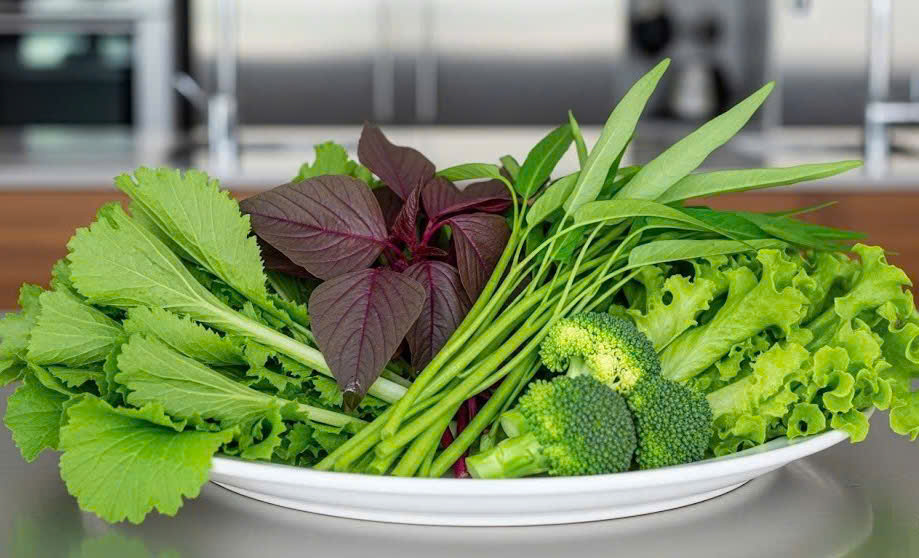Gout is a condition characterized by the deposition of urate (sodium urate) crystals in joints, causing severe pain, swelling, redness, and heat, especially in the big toe and ankle. The disease often recurs, progressing to a chronic state and leading to joint deformity if not well-managed.
Doctor Nguyen Anh Duy Tung from the Nutrihome Nutrition Center says diet plays a vital role in controlling gout. Patients should limit high-purine foods like red meat, seafood, and organ meats, and incorporate low-purine vegetables to help reduce uric acid and joint inflammation.
Leafy greens are rich in fiber, vitamins A and C, and minerals like potassium and calcium, which have a mild diuretic effect, promoting uric acid excretion through urine. Leafy greens also contain antioxidants that help reduce inflammation.
Malabar spinach has a low purine content and is rich in mucilage, vitamin C, and iron. The mucilage can improve digestion and limit purine absorption from food, while vitamin C assists the kidneys in efficiently eliminating uric acid.
Water spinach, with its high water and fiber content, along with vitamins A and C, helps cool the body, acts as a diuretic, and aids in reducing joint swelling and inflammation. Patients can boil or make soup with water spinach to help manage uric acid levels in their blood.
 |
Low-purine green vegetables help reduce uric acid and joint inflammation in gout patients. Photo: Trong Nghia |
Low-purine green vegetables help reduce uric acid and joint inflammation in gout patients. Photo: Trong Nghia
Broccoli is low in purine and high in vitamin C (about 90 mg/100 g). Vitamin C helps lower serum uric acid levels and enhances kidney filtration. The antioxidant sulforaphane in broccoli also has strong anti-inflammatory properties.
Lettuce, primarily composed of water and fiber, is low in purine and safe for gout sufferers. It also contains vitamin K, folate, and beta-carotene, which contribute to reducing inflammation, promoting vascular health, and supporting healthy weight maintenance—an important factor in managing gout.
In addition to consuming low-purine vegetables, Dr. Duy Tung advises patients to maintain a healthy diet, drink plenty of water, exercise regularly, and have regular check-ups. Adhering to treatment and monitoring uric acid, blood sugar, and blood lipid levels will limit gout flare-ups and protect long-term joint health. Patients can supplement with eggshell membrane extract, collagen type II, hydrolyzed collagen peptides, chondroitin sulfate, and turmeric extract to reduce pain, fight inflammation, regenerate cartilage and subchondral bone, and prevent joint degeneration caused by gout.
Trong Nghia
| Readers can submit questions about nutrition here for doctors to answer. |












